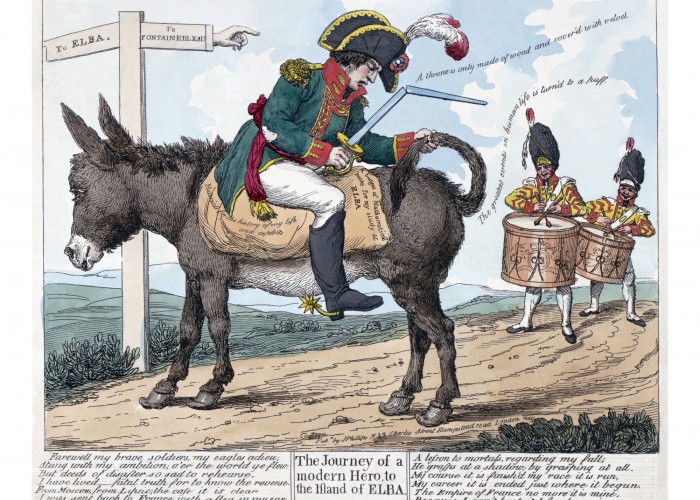The Journey of a Modern Hero to the Island of Elba
This cartoon is a satirical depiction of the exile of the French Emperor Napoleon to the island of Elba in 1814. This was Napoleon’s first defeat by the Allied nations of the Sixth Coalition, including Britain, Prussia, and Russia. Less than a year after Napoleon was overthrown, he escaped from Elba and returned to France, forcing the Sixth Coalition to reform. The Allied armies marched against him, and Napoleon was finally and conclusively defeated at the Battle of Waterloo.
By 1814, Britain had been fighting wars against France near-constantly for over 20 years. Napoleon’s armies had rampaged across Europe, and threatened to invade the British Isles multiple times. It took a huge alliance of Austria, Russia, Prussia, Britain, Sweden, Spain, Portugal and some smaller European countries – collectively known as the Sixth Coalition – to drive the French armies back towards Paris. Napoleon was finally forced to abdicate as Emperor of France on 13 April 1814, and, by agreement with the Sixth Coalition, was sent to rule the small Mediterranean island of Elba. He was made Prince of Elba – a huge step down for a man who had dominated a continent.
This cartoon illustrates contemporary English jubilation at the end of the war, and shows popular hatred for Napoleon and glee at his downfall. Napoleon is depicted seated backwards on a donkey – a traditional English method of social punishment – especially for men whose wives had cheated on them, suggesting Napoleon is impotent and humiliated. The broken sword and hangdog expression reinforce this. Everything about the satire undermines Napoleon’s self-appointed position as Emperor, even the mocking title of “modern hero”.
One of the signposts points to the French town of Fontainbleau, where Napoleon had signed his treaty of abdication with the Sixth Coalition. The other points to Elba, where Napoleon is going to be sent. Less than a year after this cartoons was printed, Napoleon returned to France and quickly raised an army – eventually being defeated permanently at Waterloo.
Click below to see a transcript of the verse at the bottom of the print
Farewell my brave soldiers, my eagles adieu;
Stung with my ambition; o’er the world ye flew
But deeds of disaster so sad to rehearse,
I have lived – fatal truth for to know the reverse
From Moscow, from Lipsie [Leipzig]; the case it is clear
I was sent back to France, with a flea in my ear.
A lesson to mortals, regarding my fall;
He grasps at a shadow, by grasping at all.
My course it is finish’d my race it is run,
My career it is ended just where it begun.
The Empire of France no more it is mine,
Because I can’t keep it I freely resign.
The last line is an especially bitter jest at Napoleon; after his final defeat at
-
Curatorial info
- Originating Museum: U.S. Library of Congress
- Production Date: May 1814
- Creator: J. Phillips
- Creation Place: 32 Charles Street Hampstead road, London
- Size: 18.9 x 22.7 cm
-
Use this image
You can download and use the high resolution image for use in a non-profit environment such as a school or college, but please take note of the license type and rights holder information below
- Rights Holder: Collection U.S. Library of Congress. Public domain.
- License Type:
Public domain
Find it here
This object is in the collection of Library of Congress







